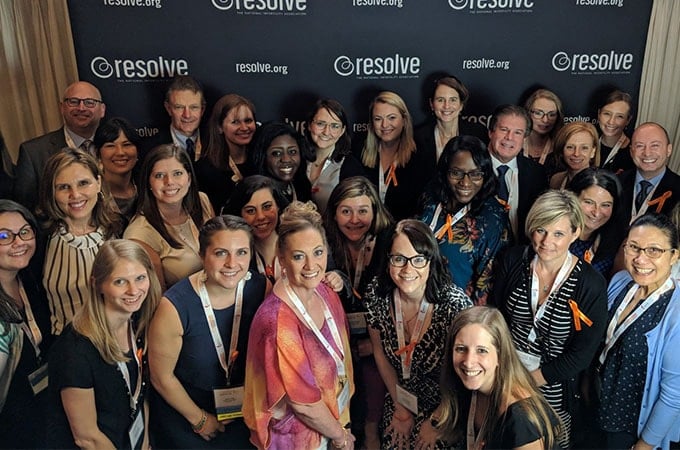Advocacy Day is an annual event hosted by RESOLVE, The National Fertility Association and sponsored by Shady Grove Fertility. It’s a day where the infertility community comes together in Washington, D.C. to support legislative initiatives that will assist the 1 in 8 couples who experience infertility. It’s a chance to make the voice of the infertility community heard. 2018’s Advocacy Day had over 200 advocates from 30 different states including over 30 Shady Grove Fertility physicians, staff, and patients.
Increasing Access to Infertility Treatment for All on Advocacy Day
During the morning training session, many RESOLVE board members spoke and gave an overview on how to advocate most effectively. The mission of the day was for the advocates to properly explain the issues and represent those who face infertility. Attendees heard from American Society for Reproductive Medicine (ASRM) Chairman, Christos Coutifaris, MD, about an exciting announcement involving a brand new bill, sponsored by Connecticut Congresswoman Rosa DeLauro and New Jersey Senator Cory Booker that was being introduced that day. The bill will:
- Require that health plans offered on the group and individual markets—in addition to the Federal Employees Health Benefit Program, TRICARE, and the VA—provide coverage for infertility treatment.
- Ensure that these health plans also cover fertility preservation services for individuals who need to undergo a medically necessary procedure that may cause infertility, such as chemotherapy.
The announcement was met with roaring applause from the room of advocates. Adoption of the bill would be a huge step forward for countless American families.
Supporting Our Veterans
The first bill on the Advocacy Day agenda was the Women Veterans and Families Health Services Act (S 700 & HR 1681). This bill provides veterans wounded in the line of duty with access to reproductive treatments and adoption assistance permanently. The original bill, which was passed after the efforts of 2016 Advocacy Day, provides IVF coverage until September 2019, but we believe it’s time to make the coverage permanent. Lauren and Kevin Jaye, patients of Dr. Jason Bromer of SGF’s Frederick, MD and Hagerstown, MD offices, were in attendance advocating for infertility benefits at the office of Maryland Senator Chris Van Hollen. Kevin is a veteran who was severely injured by an IED during his service in Iraq and required 30+ surgeries, all of which were covered by the VA. However, the only treatment not covered, despite his injury occurring while he was serving his country, was the IVF treatment that the couple would require in order to have a baby. The Jayes went on to have a baby with the help of Dr. Bromer, but made their story known by advocating for coverage for all veterans injured during service.
Making Adoption Affordable
Adoption can be expensive, and over 100,000 children are waiting to be moved into permanent homes. The Adoption Tax Credit has been around since 1997, but the importance of it staying intact during the likely upcoming tax reform is imperative to helping the 100,000+ children be adopted. This credit helps encourage adoption and eases the financial burden that adoptive families sometimes face. However, the tax credit helps only those who can use it depending on their income level and if they qualify for adoption expenses.
In addition to ensuring the credit stays intact, the goal is to advance the Adoption Tax Credit Refundability Act (S 937 & HR 2476) to encourage adoptions. The adoption tax credit needs to be made refundable so that low- to moderate-income families can afford to adopt children.
Continuing Medical Research Funding
Reproductive disorders such as polycystic ovary syndrome (PCOS) and endometriosis represent a large portion of female factor infertility. Research related to these conditions as well as other infertility disorders is vital to helping Americans build their families. Sustained support for the National Institutes of Health (NIH), and specifically the National Institute of Child Health and Human Services (NICHD), where most of the research related to reproductive health and infertility is supported, will be needed in the next year to continue the important work in progress.
Recognizing Infertility as a Disease
Infertility is recognized as a disease by the World Health Organization (WHO) and the American Medical Association (AMA). However, the United States lags behind most developed countries in access to treatments for infertility.
At the meetings with Congressional representatives on Advocacy Day, Dr. Stephen Greenhouse of SGF’s Fair Oaks and Haymarket, VA offices explained, “Currently, many insurance plans cover the cost of infertility diagnosis, but provide no coverage for infertility treatment. This would be unheard of for other recognized diseases such as diabetes or heart disease.”
Not being able to afford care may also lead a couple to seek more aggressive fertility treatment options that may lead to premature deliveries and higher long-term care costs for the Federal government. “Wider access to infertility insurance coverage can provide safer and more cost-effective treatment options to be considered up front,” added Dr. Greenhouse.
A 2017 national survey of employer-sponsored health plans found that 44 percent of employers with at least 500 employees did not cover infertility services. The new Access to Infertility Treatment and Care Act bill is a great step forward in the right direction in making infertility coverage available to all.
Dr. Gilbert Mottla of our Annapolis, MD offices, perfectly summed up the power of Advocacy Day by saying, “Whenever I visit Capitol Hill I feel the strength of our democracy and get just a bit of a chill walking between buildings in front of our Supreme Court and Library of Congress.” At Shady Grove Fertility we enjoy being able to support our patients by speaking up and making our voices heard. Having a family is a basic human right and SGF continues to make parenthood possible for couples all over the world.
To learn more about Advocacy Day or to schedule an appointment, please contact our New Patient Center at 1-877-971-7755 or complete our brief online form.






